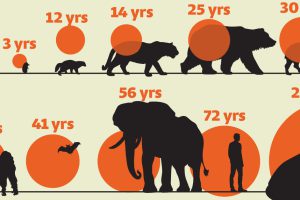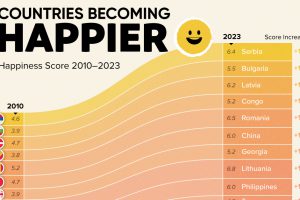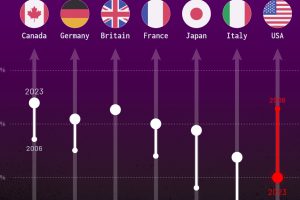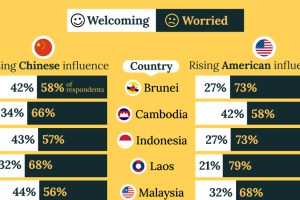One Year of War
On February 24, 2022, Russia invaded the eastern territories of Ukraine, claiming ownership of the Donetsk and Luhansk regions. This began one of the largest military conflicts in modern European history.
After a year of casualties, structural devastation, and innumerable headlines, the conflict drags on. Many report the impacts to the economy, social demographics, and international relationships, but how do science and academia fair in the throes of war?
Within the actions and responses of the conflict, we take a look at how six key scenarios globally shape science.
War’s Material Impacts to Science
1. Russia Invades Ukraine
The assault to research infrastructure in Ukraine is devastating.
Approximately 27% of buildings are damaged or destroyed. The country’s leading scientific research centers, like the Kharkiv Institute of Physics and Technology, or the world’s largest decameter-wavelength radio telescope, are in ruins.
While the majority of research centers remain standing, many are not operating. Amidst rolling blackouts and disruptions, a dramatic decrease in research funds (as large as 50%) has cut back scientific activity in the country.
Rebuilding efforts are underway, but the extent to which it will return to its former capacity remains to be seen.
2. Ukraine Fights Back
As research funds have been redirected to the military, and scientists, too, have pivoted in a similar way. Martial law and general mobilization have enlisted male researchers, especially those with military experience and those within the 18-60 age range.
Women were exempt until July 2022. Those with degrees in chemistry, biology, and telecommunications were required to enter the military registry.
For both men and women researchers alike, these requirements meant staying in the country for the remainder of the year. Extensions for mobilization have subsided as of February 19th, 2023.
Social Impacts of War to Science
3. Western Leaders Exclude Russia
One year ago, scientists and institutions around the world immediately launched into protest against Russia’s escalation:
- The European Commission agreed to cease payments to Russian participants and to not renew contract agreements for Horizon Europe
- The $300-million, MIT-led Skoltech program was dissolved one day after the war began, with no foreseeable restart in the future
- Various governments and research councils in the European Union froze collaborations and discouraged working with Russian institutions
- The European Organization for Nuclear Research, CERN, barred all Russian observers and will dismiss almost 8% of its workers—about 1,000 Russian scientists—hen contracts expire later this year
These condemnations, and more, remain in effect today and are emboldened by what has come to be known as a “scientific boycott”.
Journal publishers around the world imposed some of their own sanctions on Russian institutions and scientists in light of this boycott. These range from prohibiting Russian manuscript submissions (Elsevier’s Journal of Molecular Structure) to scrubbing journal indices of Russian papers and authors.
4. Russia Dissociates from the West
As a response to the sanctions imposed on the Russian economy, Russia ceases to sell natural gas to most of Europe. Institutions are reassessing their usage and dependence on Russian energy, but alternatives are not yet affordable.
The German Electron Synchrotron (DESY) in Hamburg, home to the world’s most powerful X-ray laser, is struggling with rising electricity costs. CERN, for instance, has already cut its data collection for the year by two weeks in order to save money.
This makes it difficult for pre-war projects to continue collaborating with Russia. As a result, there are questions about how withdrawals may be affecting Russian science, too.
For now, that remains relatively unknown, though some have guesses. Young scientists, many barred from attending international conferences and meetings, may seek employment or opportunity elsewhere to develop their careers. Some speculate a “brain drain” effect may occur, similar to the academic fallout of the Soviet Union’s collapse in the 1990s.
How Russia will participate in pre-war international research collaborations is still unknown. For now, a number of pre-war projects ranging from the Arctic to the fire-prone wilds of northern Russia are on hold. All of these scenarios paint a concerning picture about the progress of research.
There are indications that Russian scientific collaboration may already be shifting eastward.
Philanthropic Impacts of War to Science
5. New Homes for Ukrainian Science
Finding support for Ukrainians emigrating from the conflict is difficult, but not impossible. Though many Ukrainians scientists remain in the country making the best of a difficult situation, approximately 6,000 are now living abroad.
Most Ukrainian emigrants are now living in Poland and Germany. Some scientists continue to work remotely, supporting projects at their home institutions or with new research programs they’ve found since relocating.
These success stories are thanks to the work of a number of ad-hoc mobilizations that help keep researchers working in the European cooperation. Groups like MSC4Ukraine help postdoc students and researchers find new opportunities across Europe. Social media trends like #Science4Ukraine help connect researchers to other supportive movements.
6. The International Rebuilding of Ukrainian Science
Various research institutions have also lent support to the survival and rebuilding of science in Ukraine:
- The largest science prize, the Breakthrough Prize, recently donated $3 million to fund research programs and reconstruction efforts
- Federal research councils, like those in Netherlands and Switzerland, also have programs to formally support displaced scientists and researchers
- The European Union is investigating new funding schemes that could repurpose almost €320 billion of frozen Russian Federal Reserves
No Consensus on Boycott
While the Western front seems united in it’s condemnation of the war, the international science community isn’t in total agreement with a science boycott.
Some scientists argue that excluding Russian scientists—especially those who have vocalized their disdain for the war—serves to punish unrelated individuals. This fractures the benefits of international scientific exchange.
Others, especially those in countries who are economically dependent on Russia, have remained silent or even supported the invasion. In these cases, Russia’s science initiatives may lean more heavily in their direction.
It’s easy to appreciate how war complicates many different angles of the global research ecosystem. After one year, how things will turn out remains a mystery. But one thing is for certain: science adapts and progresses even in the bleakest times. For now, supporting all efforts to reduce conflict remains in science’s best interests.
Full sources here





